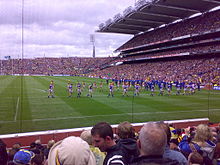
Back قذف (رياضة) Arabic Hurling Catalan Hurling Czech Hurling Danish Hurling German Χέρλινγκ Greek Iomano Esperanto Hurling Spanish Hurling Estonian Hurling Basque
 82,001 people at the 2009 All-Ireland Senior Hurling Championship Final between Kilkenny and Tipperary at Croke Park in Dublin | |
| Highest governing body | Gaelic Athletic Association |
|---|---|
| First played | Prehistoric origin |
| Characteristics | |
| Contact | Full |
| Team members | 15 players per side substitutes are permitted |
| Mixed-sex | Camogie is the female variant |
| Equipment | Sliotar, hurley, helmet (not optional) |
| Presence | |
| Olympic | Demonstration sport 1904 |
| Paralympic | No |
| Hurling | |
|---|---|
| Country | Ireland |
| Reference | 01263 |
| Region | Europe and North America |
| Inscription history | |
| Inscription | 2018 (13th session) |
| List | Representative |
Hurling (Irish: iománaíocht, iomáint) is an outdoor team game of ancient Gaelic Irish origin, played by men. One of Ireland's native Gaelic games, it shares a number of features with Gaelic football, such as the field and goals, the number of players and much terminology. The same game played by women is called camogie (camógaíocht), which shares a common Gaelic root.
The objective of the game is for players to use an ash wood stick called a hurley (in Irish a camán, pronounced /ˈkæmən/ or /kəˈmɔːn/) to hit a small ball called a sliotar /ˈʃlɪtər/ between the opponent's goalposts either over the crossbar for one point or under the crossbar into a net guarded by a goalkeeper for three points. The sliotar can be caught in the hand and carried for not more than four steps, struck in the air or struck on the ground with the hurley. It can be kicked, or slapped with an open hand (the hand pass), for short-range passing. A player who wants to carry the ball for more than four steps has to bounce or balance the sliotar on the end of the stick (solo), and the ball can only be handled twice while in the player's possession.

Provided that a player has at least one foot on the ground, he may make a shoulder-to-shoulder charge on an opponent who is in possession of the ball or is playing the ball, or when both players are moving in the direction of the ball.
No protective padding is worn by players. A plastic protective helmet with a faceguard is mandatory for all age groups as of 2010. The game has been described as "a bastion of humility", with player names absent from jerseys and a player's number decided by his position on the field.[1]

Hurling is administered by the Gaelic Athletic Association (GAA). It is played throughout the world[citation needed] and is a fixture of life in many parts of Ireland. Hurling has some popularity among members of the Irish diaspora in North America, Europe, Australia, New Zealand, South Africa, Dubai and Argentina.[1] It has featured regularly in art forms such as film, music and literature. The final of the All-Ireland Senior Hurling Championship was listed in second place by CNN in its "10 sporting events you have to see live", after the Olympic Games and ahead of both the FIFA World Cup and UEFA European Championship.[2] After covering the 1959 All-Ireland Senior Hurling Championship Final between Kilkenny and Waterford for BBC Television, English football commentator Kenneth Wolstenholme was moved to describe hurling as his second favourite sport in the world.[3] Alex Ferguson used footage of an All-Ireland Senior Hurling Championship final in an attempt to motivate his players during his time as manager of Premier League football club Manchester United. The players winced at the standard of physicality and intensity in which the hurlers engaged.[4] In 2007, Forbes magazine described the media attention and population multiplication of Thurles town ahead of one of the game's annual provincial hurling finals as being "the rough equivalent of 30 million Americans watching a regional lacrosse game".[1] Financial Times columnist Simon Kuper wrote after Stephen Bennett's performance in the 2020 All-Ireland Senior Hurling Championship Final that hurling was "the best sport ever and if the Irish had colonised the world, nobody would ever have heard of football".[5]
UNESCO lists hurling as an element of Intangible cultural heritage.[6]
- ^ a b c Cramer, Ben (23 April 2007). "Pitch Man". Forbes.
- ^ Donnelly, Shawn (2 April 2012). "10 sporting events you have to see live: Because the real glory of athletic competition is being able to say, "I was there!"". CNN. Archived from the original on 5 April 2012. Retrieved 2 April 2012.
- ^ Wolstenholme, Kenneth (13 September 1959). "Why Keep This Great Game Such A Big Secret? Considering that it is play all over the island of Ireland from dingle to borris right up to the streets of belfast". Sunday Press. Retrieved 8 February 2007.
- ^ Ó Sé, Tomás (20 July 2019). "The commitment Fergie was so impressed by a decade back has now gone to another level". Irish Independent.
I'm not sure if it was one of those blood-and-thunder Kilkenny-Tipperary epics, but the wealthy superstars of Carrington were suitably impressed, wincing at the raw physicality on show... Ferguson was well educated on the GAA from the time that Kevin Moran was briefly double-jobbing with United and the Dubs... But the commitment Fergie was so impressed by a decade back has now gone to another level.
- ^ "GAA tweets of the week". Hogan Stand. 14 December 2020.
- ^ "Hurling – intangible heritage – Culture Sector". UNESCO. Retrieved 29 November 2018.
© MMXXIII Rich X Search. We shall prevail. All rights reserved. Rich X Search